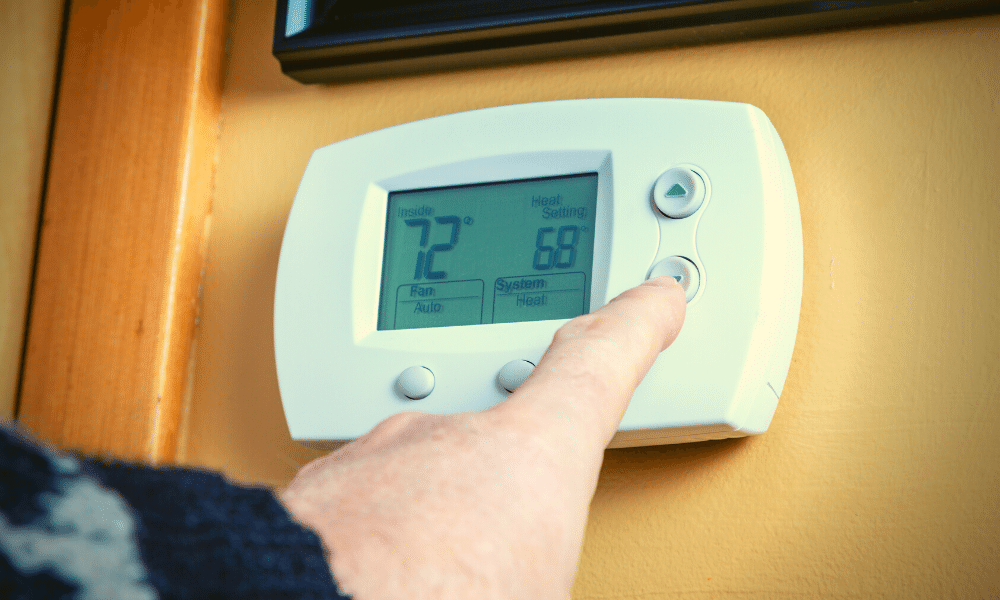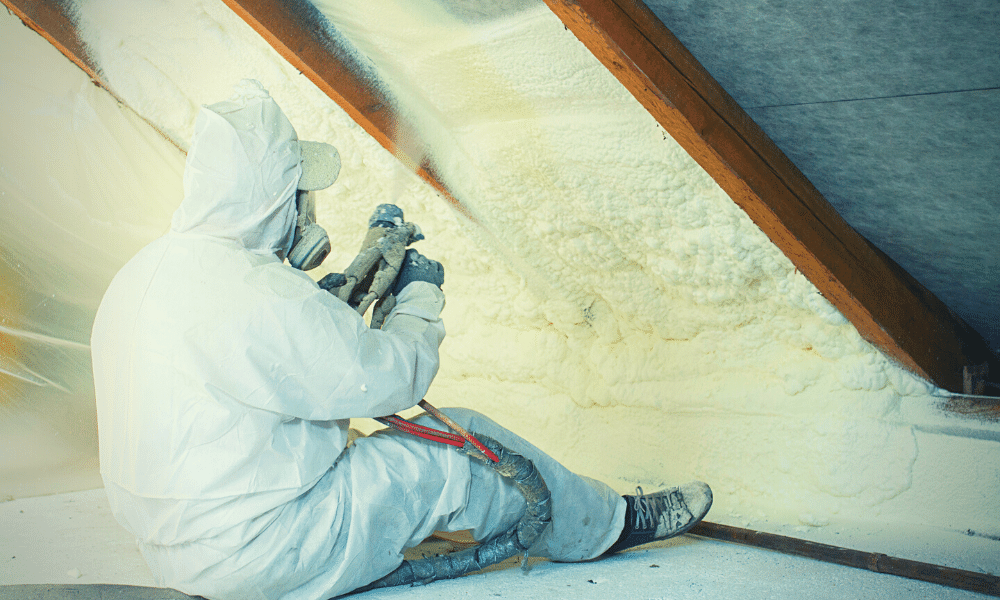You want to reduce your monthly energy bill. But do you know what foam insulation can do for you?
Foam insulation is a great way to save money over traditional insulation such as fiberglass and cellulose. However, the exact amount depends on many factors.
These factors can help customers save between 15% and 50% on their monthly energy bills, especially if they have only one area of insulation compared to the whole house.
While we are in the foam insulation industry, we also educate homeowners. We’ll explain why foam insulation is important, what the air seal does, and how it affects the energy bills.

How can spray foam save you money?
The air seal that spray foam insulation creates is the key to saving money on heating or cooling.
According to the U.S Energy Information Administration, 51% of households’ annual energy consumption in 2021 was for space heating and air conditioning. Imagine if one of these things is constantly running because it’s impossible to maintain constant temperatures in your home.
If your home is not maintaining a consistent temperature or you feel uncomfortable in any room, it is likely that the air you pay for to heat or cool the house is leaking out.
Spray foam insulation is the perfect solution because it seals the outside air inside and keeps the elements outside out.
The U.S. Department of Energy recommends that you reduce air leakage by sealing your home’s envelope from top to bottom with proper insulation.
Foam is the only insulation material that can create a complete home air seal, and it’s cheaper than traditional insulation.
Spray Foam Insulation R Value
R-Value of spray foam insulation can vary depending upon the product and manufacturer.
Open cell spray foam insulation is R-3.6 to R-3.9 per inch. This R-Value is normal for open cell spray foam.
Closed cell spray foam insulation is R-6 to R-7 per inch
Spray foams come in a variety of sizes. This is why some spray foams have a different R-Value.
The R-Value for spray foam is affected by a few things: the type and age of the foam as well as how resistant it is to moisture.
Just the type of foam insulation will affect the R-Value. Open cells are lighter materials, which means that the R-Value will be lower. Closed cells, on the other hand, are thicker and denser, so the R-Value will be higher. Because of its dense composition, heat transfers slower through closed cell spray foam.
It’s now time to share an amazing cooking analogy. A regular skillet made of metal heats up quickly and cools down quickly because it’s thinner. Cast iron is thicker and denser than regular metal, so it takes longer for it to heat up in my kitchen.
The material’s age is another factor that affects spray foam R-Value. Because some foam brands can degrade over time, it is important to know the age of the foam. RetroFoam of Michigan’s foam insulation doesn’t degrade or break down over time.
The foam insulation’s moisture permeability also plays an important role. The R-Value of spray foam insulation will be lower if it is saturated with water. This is especially true for open cell spray foam, which is moisture permeable.
Closed cell spray foam has a moisture impermeable structure, which means that water can’t move through it. This affects the R-Value.
How much can you save on your monthly energy bills by spray foam?
There are many ways to save money on your monthly energy bills. However, we have heard homeowners say that they were able to save anywhere from 30-50 percent by having their entire house insulated.
It’s great to save a little on cooling and heating costs, but there are still other things you should consider.
Foam insulation is a cost-saving investment that can be done quickly and easily. This is not true if fiberglass or other cellulose insulation is installed in your home.
Both fiberglass and cellulose will eventually deteriorate, sag, and settle over time. The cellulose must be maintained regularly and eventually, the fiberglass will have to be replaced.
Foam insulation is never damaged, it doesn’t shift or sag, and it won’t need to be replaced if it gets old. This alone will save you time and money since you don’t have to pay for replacements.
Factors that determine monthly energy bill savings
We mentioned that homeowners reported a reduction of between 30 and 50% on their monthly energy bills. But what makes this difference?
There are several factors that can impact how much you save on your monthly bills. Let’s look at your HVAC system, furnace, AC unit, windows, doors, and any foam insulation in your home.
HVAC System and Ducts
It’s possible that your HVAC system and ducts have not been maintained for a while.
If you want to have an energy-efficient home, this is the system you must run efficiently.
Foam insulation in your house will give you the air seal that you desire. However, if your HVAC system doesn’t get maintained and tuned up you’ll end up paying for it.
Service your furnace and AC unit at least once a year. This includes cleaning and changing the filters, as well as cleaning the ducts.
These units will run more efficiently if they are maintained annually. With foam insulation, a more efficient furnace and AC unit will mean more money in your pocket.

AC Unit and Furnace
Let’s talk a bit more about the mechanicals. Are you setting your furnace high in winter and your air conditioner low in summer? These two factors can have a significant impact on the savings you get after spray foaming your entire house.
The foam creates an air seal which allows air to remain inside the room you desire. You won’t have to adjust your furnace or AC constantly to maintain your home’s comfort.
The Department of Energy has some tips that will help you maintain your furnace and AC unit in good shape.
You can save around 10% each month by setting your thermostat down 7-10 degrees for 8 hours per day. This temperature can be set for work or sleep. You could set the thermostat at 68°F in winter, and 78° in summer.
Keep in mind that blasting appliances to heat or cool down your home will not work as fast as you might think. It will not make a difference in how long it takes to make your home comfortable, and will only increase your monthly costs.
Windows and Doors
Foam insulation can be installed in your home but if your windows or doors don’t work, you will lose more money.
You can feel the cold air moving in through your windows and doors in winter.
If the rest of your home is not efficient, air sealing can only get you so far. Your furnace and AC will continue to run if the air is getting through your windows and doors. The foam will not seal the air leakage so you’ll pay less.

Foam insulation is used to insulate areas of the home.
Foam insulation can only be used in one area of your house. You won’t get the same savings on your monthly energy bills.
This is not to suggest that you shouldn’t start by reorganizing a small section of your home. However, if you want to save the most money, you should consider the whole house. Let’s suppose you decide to insulate only your walls. This could lead to a problem known as a stack effect.
The stack effect is caused by air movement and high energy bills. The crawl space is where outdoor air enters your home, and then it moves up to your living area. Foam walls protect your walls from the outside air. The air builds pressure and continues moving upwards, taking with it any treated air. Air movement continues upwards to the attic, and out through the roof.
This is why we recommend insulating your entire home and creating an air seal around the entire building envelope to prevent air movement.
Foam Insulation: Reduce Monthly Energy Bills
Foam insulation can help reduce monthly energy bills. But, there are more things to consider than simply adding foam insulation.
It’s worth contacting your energy provider to request a home audit to improve your home’s energy efficiency. A home energy audit will examine your appliances and determine their efficiency. The auditor will also perform a blower door test to check for air leaks. Finally, the auditor will inspect your exhaust pipes and look for gas leaks.
You will save money on your monthly bills by adding foam to your home.
